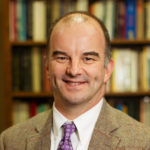by Carl Trueman
If there is one question that seems to drive so much of modern life it is that of happiness. What is it? How does one attain it? And perhaps more deeply, how does one know when one has attained it? And it is therefore perhaps fitting that the Psalter, the great hymn book of the soul, begins with a description of what it is that characterized the ‘happy man’.
Readers of the English translation might be surprised by this, for many such translate the first line as ‘Blessed is the man’ not ‘Happy is the man.’ The reason is that the Hebrew word means both things in English. In fact, we might say that not just the word but the concept of blessedness is the same as that of happiness in the Psalmists mind. We live in a world where happiness is typically regarded as a psychological state. The Psalmist’s world is one where happiness is being blessed by God.
That is clear from what follows. The happy man is characterized by the ease of his relationship with his God. He steers clear of unpleasant and evil company, preferring instead to meditate upon God’s revelation. He is a man who delights in the God to whom he is devoted. And as the Psalmist tells us, he is therefore a man of substance and stature. Ironically, those who pursue the things that many today would regard as bringing happiness – those to whom the happy man is implicitly contrasted in verse 1 – are ultimately of little account, nothing more than ephemeral chaff.
There is first a significant moral lesson here. The things of this world ultimately lack substance and, if we devote ourselves to them, we will lack substance too. As the Psalmist will declare in Psalm 115, those who make and worship idols will ultimately be as spiritually dead as those things to which they are devoted. Devotion to the living God, by way of contrast, is life because it is vitally connected to the source of life.
Yet there is a problem here: in reading this Psalm, who of us can see ourselves in the happy or blessed man? We know that, despite our best intentions, we have not shunned the things that the happy man rejects, nor have we devoted ourselves to God as he has. We also know the state of our own hearts – how even our best thoughts are marred by selfishness and sin. So does this Psalm become nothing more than a backbreaking source of discouragement and angst for the modern day reader?
That is where a Christological reading becomes important. While the Psalm certainly sets forth a vision of what a life blessed by God should look like, it also thereby points us to Christ. Christ frequently quoted the Psalms. We know that they speak of him and can only be fully understood when set in that context. And so here, at the very start of the Psalter, we find set before us a beautiful portrait in miniature of the man who pleases God and is blessed by him. And that we then find fulfilled in Christ.
As such the Psalm ceases to be something that places a burden on us by merely presenting us with a standard to which we cannot measure up. Yes, it does present such a standard but in doing so it calls on us to look outside of ourselves for salvation. We do not find this blessedness in ourselves or through our own efforts. We find it rather in Christ, to use Paul’s terminology. Christians are blessed in him as they grasp his person and work through faith. And that is blessing indeed.
More Come, Follow Me resources here.
 Carl R Trueman is a graduate of the Universities of Cambridge (MA) and Abderdeen (PhD) and formerly served on faculty at the Universities of Nottingham and Aberdeen and Westminster Theological Seminary (PA). Before joining the Grove City College faculty in 2018, he was the William E. Simon Visiting Fellow in Religion and Public Life at Princeton University. He is married with two adult sons and is also an ordained minister in the Orthodox Presbyterian Church. He is the author of numerous books, including Histories and Fallacies and The Rise and Triumph of the Modern Self, both from Crossway, and joint editor (with Bruce Gordon) of The Oxford Handbook of Calvin and Calvinism (Oxford University Press, forthcoming).
Carl R Trueman is a graduate of the Universities of Cambridge (MA) and Abderdeen (PhD) and formerly served on faculty at the Universities of Nottingham and Aberdeen and Westminster Theological Seminary (PA). Before joining the Grove City College faculty in 2018, he was the William E. Simon Visiting Fellow in Religion and Public Life at Princeton University. He is married with two adult sons and is also an ordained minister in the Orthodox Presbyterian Church. He is the author of numerous books, including Histories and Fallacies and The Rise and Triumph of the Modern Self, both from Crossway, and joint editor (with Bruce Gordon) of The Oxford Handbook of Calvin and Calvinism (Oxford University Press, forthcoming).
